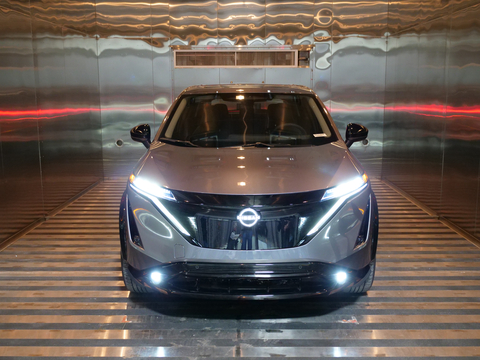Nissan rigorously tests EVs like Ariya to ensure they perform as expected in a wide variety of weather conditions
Michigan winters are cold, but inside a unique chamber at Nissan Technical Center North America (NTCNA) near Detroit, it’s even colder.
This press release features multimedia. View the full release here: https://www.businesswire.com/news/home/20250108314545/en/

Michigan winters are cold, but inside a unique chamber at Nissan Technical Center North America (NTCNA) near Detroit, it’s even colder. "Our chambers are capable of temperatures ranging from -40 degrees Fahrenheit to 176 degrees Fahrenheit," said Jeff Tessmer, senior manager of Zero Emission Vehicles at NTCNA. (Photo: Business Wire)
“Our chambers are capable of temperatures ranging from -40 degrees Fahrenheit to 176 degrees Fahrenheit,” said Jeff Tessmer, senior manager of Zero Emission Vehicles at NTCNA.
And within the walls of these temperature- and humidity-controlled chambers, Nissan has tested the all-electric Ariya in conditions far more extreme than what the typical driver will encounter.
“We want to test the worst-case scenario so that our customers will still get the same performance in a wide variety of weather conditions,” Tessmer said.
To test if the Ariya can maintain its level of charge even when left in the bitter cold, Tessmer and his team routinely conduct a “cold soak” test. In a 24-hour cold soak conducted in early 2024, an Ariya was parked with 17% battery charge in -4 degrees Fahrenheit conditions without being plugged in or using its battery heater.
When the team returned a full day later, the Ariya retained its 17% charge and started immediately.
It's one of many temperature tests the team conducts when validating a vehicle before production begins. Some components are tested at temperatures as low as -40 degrees Fahrenheit.
The Ariya is equipped with several systems to help it perform in extreme heat and cold. On hot days, a liquid-cooled thermal management system keeps the battery at an ideal temperature. On cold days, a battery heater does the same. Drivers can turn on the battery heater before driving to ensure it’s at an optimal temperature when they depart.
Through the MyNISSAN app1, drivers can warm the cabin, check the interior temperatures and set a charging schedule.
“When it comes to combatting cold temperatures, the Ariya is very well equipped,” said Ansu Jammeh, an engineer on Nissan’s Zero Emissions Engineering team. “The MyNISSAN app lets you prepare the car well in advance. You can even set a timer so that every day, it will warm up at the same time.”
Jammeh said it’s most efficient to utilize the heating features when the vehicle is plugged in so that it uses power from the grid instead of the vehicle.
“That way, your car is warm and cozy without having to draw on the vehicle’s battery before you start your trip,” he explained.
When away from home, drivers can also use the app to easily find a charger on the Nissan Energy Charge Network2.
There are several advantages to having an Ariya in cold weather climates, including its available e-4ORCE All-Wheel Drive. Plus, its cabin heats up much faster than an internal combustion vehicle because it does not rely on an engine to warm.
“EVs get warmer faster. It’s just the nature of the product,” Jammeh said.
Nissan has been a pioneer in the electric vehicle space since LEAF debuted in 2009, and has mastered the art of testing EVs for durability and performance. The testing process takes years, and it’s time well spent.
“Customers can get in their vehicles and expect the same performance every time,” Jammeh said. “Your car is ready for you every day without any drama, wherever you live.”
About Nissan USA Stories
The Nissan USA Stories page explores the best of Nissan’s people, products, technology and more. New to the page? Subscribe here to receive alerts when a new story is published.
1 Feature availability is dependent on vehicle model, trim level, packaging and options. Trial included with vehicle purchase. Consumer activation of NissanConnect Services package required. Compatible connected device and wireless network may be required. Refer to connected device’s owner’s manual for details.
2 Public charging networks are provided by independent companies and are subject to their own respective policies, terms, and/or conditions, and are not within Nissan’s control. Should such independent companies terminate or restrict service or features, service or features may be suspended or terminated without notice or with no liability to Nissan or its partners or agents. Nissan is not responsible for associated costs (including additional equipment or equipment replacements/upgrades, if available) or other third party changes that may be required for connectivity with a charger station. Availability of charging stations not guaranteed.
View source version on businesswire.com: https://www.businesswire.com/news/home/20250108314545/en/
Contacts
Eric Ruble
Sr. Specialist, Technology & Safety Communications
Eric.Ruble@nissan-usa.com





